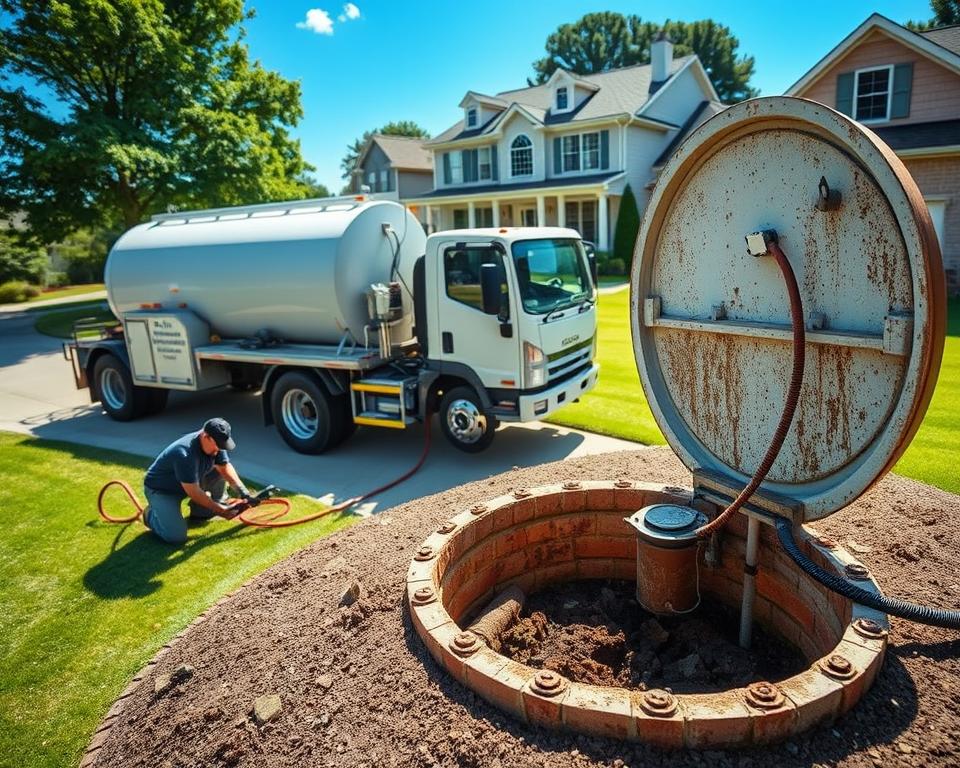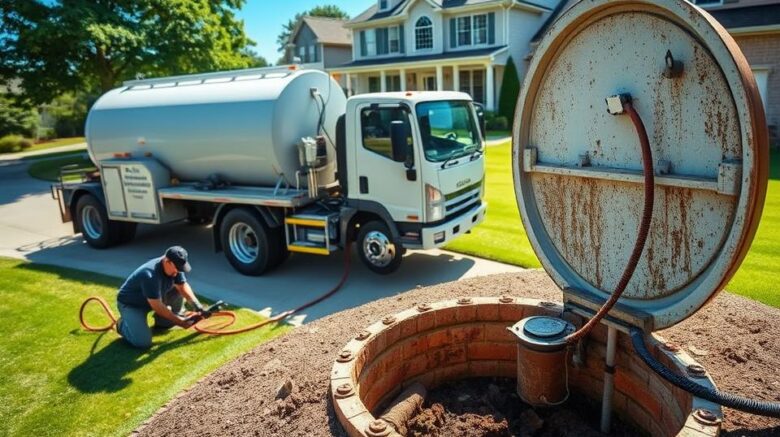Septic System Pumping
Do you ever think about how often you should arrange septic system pumping to avert expensive failures? With more than 20 percent of U.S. households depending on septic systems, grasping their maintenance is essential. Having a clear idea of when to book a septic tank service is paramount to its longevity. In addition, there are affordable septic pumping services that ensure top-notch functionality minus the big price tag. We’ll explore critical upkeep recommendations helpful for every homeowner.
Essential Points
- Scheduled septic system pumping is vital for optimal operation.
- Recognizing the symptoms that signal the necessity for service can prevent major issues.
- Hiring qualified septic system pumpers ensures reliable maintenance.
- Cost-effective septic pumping options are available for homeowners.
- Regular inspections promote peak system performance.
Understanding Your Septic System
A septic system performs a crucial role in handling household wastewater, comprising several important components that work collectively. The primary drain line channels wastewater from your home to the septic tank, where the process starts. In the tank, an underground chamber, solids accumulate at the bottom, and bacteria digest these solids, processing the waste efficiently.
The processed liquid outflow then travels from the septic tank to the distribution box, where it is dispersed evenly across the drain field or leach field. Here, the soil extends the filtration, additionally purify the wastewater. Comprehending the functions of these septic system parts is essential. It empowers homeowners to monitor and upkeep their systems efficiently.
Being aware of how your septic system operates helps you implement proactive maintenance measures. It’s advisable to have periodic appointments with professional technicians of septic systems – septic cleaning. They offer crucial insights for optimal performance of your system. These professionals assist in scheduling the essential pump-outs and checks. This attentiveness can considerably extend your septic system’s lifespan.
The Value of Septic System Care
Maintaining your septic tank on a routine basis is key for homeowners who aim for their system to last. A well-cared-for system provides peace of mind and secures your property’s value. Without appropriate care, you’re exposing yourself to system breakdowns and health dangers.
Choosing a first-rate septic pumping service is important. They provide timely inspections and pump-outs, extracting sludge and scum buildup. If maintenance is overlooked, emergency pumping may be required, which is costly.
Adhering to a steady maintenance plan is wise. It entails professional evaluations and regular pumping. This preventive measure prevents urgent issues, creating a healthier living environment for everyone.

Warning Signs for Septic Systems
Staying mindful of septic system issues can prevent expensive repairs and major damage. Typical signs signal when your system demands a check. These consist of:
- Slow drains throughout the house
- Pooling water in the yard above the drain field
- Foul odors near the septic tank or leach field
- Remarkably green grass growth in specific areas of your yard
These symptoms could signify problems that might cause your system failing. Swift intervention is critical. Calling in septic pumping professionals for an inspection assists. Timely action stops initial issues from turning into large ones. Moreover, consistent upkeep ensures your system works well and has a longer life.
Best Practices for Septic System Pumping
Timely pumping of your septic tank is crucial to sidestep costly clogs and backups. It’s important to determine the right schedule for maintenance. Homeowners should typically schedule pumping every 2 to 5 years, subject to the tank’s size and household wastewater levels. Heavy use of garbage disposals may necessitate more frequent pumping.
Employing experienced pumpers means your tank gets a thorough clean and check-up. During pumping, technicians look for any issues, such as broken baffles. Spotting these problems at an early stage prevents costlier expenses and inconveniences later. Routine pumping schedules and expert help provide your septic system’s efficient operation.
Why Routine Inspections Matter
Regular inspections are vital for your septic system’s efficiency. Septic system inspections reveal minor issues before they grow. Experts advise inspections every three to five years, guided by system size and household usage. This avoids costly fixes.
Keeping maintenance records is important for tracking your system’s condition. These records give insights into previous inspections, repairs, and the right time to schedule septic tank cleaning services. With this information, preparing for future upkeep becomes easier, retaining septic systems in excellent shape.
Frequent inspections and detailed record-keeping not only boost system efficiency but also lengthen its life. This strategy protects the environment and the investment in a safe, operational home.
| Inspection Type | Recommendation Frequency | Benefits |
|---|---|---|
| Visual Inspection | Annually | Identify surface issues |
| Professional Inspection | Every 3–5 years | Assess functionality and detect problems |
| Septic Tank Pumping | Every 3–6 years | Prevent overflow and system failure |
Using Water Wisely to Improve Septic Longevity
Mindful water use is essential for keeping your septic system sound. It not only helps the environment but also improves the performance of your home’s plumbing. By embracing easy, yet effective, conservation methods, homeowners can cut down on wastewater.
Space out your laundry activities over the week instead of doing them all at once. This enables the septic system to handle water better and avoids tank overflow. Opting for low-flow fixtures in your kitchens and bathrooms leads to considerable water savings, retaining the water pressure up while cutting the flow rate, thus lowering the amount of wastewater produced each day.
Quickly fixing leaks is another practice to assist your septic system. Even a small leak can result in a large waste of water, putting extra pressure on the septic system. Through frequent inspections and repairs, you greatly aid the system’s efficiency.
Focusing on water conservation isn’t just beneficial for your septic system; it’s also a step towards environmentally responsible living. Making such practices into your daily routine serves both your household and the planet.
Managing Household Waste Correctly
Homeowners hold a crucial role in maintaining their septic system’s health by managing household waste properly. It’s essential to avoid throwing away non-biodegradable items like wipes, plastics, and other damaging products in the system. These items can trigger clogs, resulting in expensive repairs and a drop in efficiency.
Recycling food scraps and organic materials is a advantageous alternative to throwing them in the trash. This practice greatly lowers the amount of solid waste entering the septic tank. Emphasizing biodegradable waste disposal preserves the ecological balance needed for effective waste management.
It’s important to keep an eye on what goes down the drains. Non-decomposable items can necessitate more frequent septic tank pumping. By learning and following correct waste disposal methods, you can guarantee a more efficient and long-lasting septic system.
Safe Cleaning Products for Your Septic System
The health of your septic system depends significantly on your choice of cleaning products. Opting for septic-safe cleaning products is crucial. These products shield the balance of beneficial bacteria that digest waste. Many standard cleaners have harmful chemicals that jeopardize this balance, resulting in expensive repairs or system failure.
Homeowners should try natural alternatives that are both efficient and environmentally friendly. Common household items like baking soda, vinegar, and lemon juice are superb choices. These natural cleaners are not only capable but also support your septic system’s health.
Steering clear of products that contain antibacterial agents and chlorine bleach is important. Such substances harm the helpful good bacteria, weakening your system’s functionality. By picking sustainable products, you ensure both the efficiency and longevity of your septic system.
Why Bacteria Matter in Septic Systems
Bacteria play a key role in keeping your septic system healthy. They digest solids naturally and improve nutrient processing. A lack of healthy bacteria can lead to system failure, creating hefty repairs.
Homeowners can enhance their system by introducing organic additives. These products raise beneficial bacteria, making waste decomposition more efficient. It’s important to select organic additives that are advantageous, not harmful, to the septic environment.
A robust bacterial community is essential to a septic system’s longevity and efficiency. It avoids solid buildup and reduces the need for repeated pumping. Emphasizing bacterial health creates waste management more effective and eco-friendly.
Final Reflections
Septic system care is essential for the durability and functionality of your home’s wastewater system. Sticking with critical maintenance tips sidesteps hefty repairs. Understanding routine pumping and inspections is paramount. This guarantees your septic system remains in top condition.
Learning about your septic system’s operation and proper methods in water and waste management is crucial. Engaging professionals like All in Sanitation provides expertise. This contributes to your septic system’s long-term health and provides confidence.
Putting effort into proper septic maintenance today delivers future benefits. It safeguards your home and improves your family’s quality of life. Emphasizing septic system care provides certainty with a well-maintained system.
